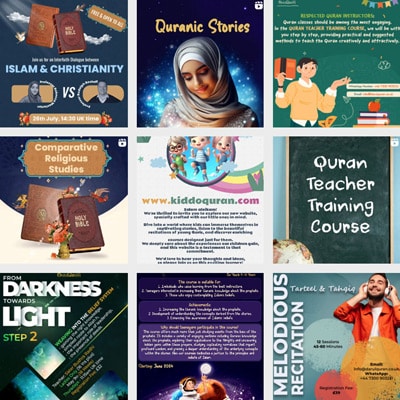Whoever struggles to meet the need of a patient – if it be obtained or not-, he/she likes a child is born from mother as if he/she did not do any sin.
Prophet Muhammad (S)
Table of Contents
ToggleIblis, also known as Shaitan, is a prominent figure in Islamic theology and the Holy Quran. He plays a pivotal role in several narratives and is often depicted as a symbol of temptation and evil.
Iblis in Islamic Theology
Adversary of Humanity
One of the main characteristics associated with Iblis in Islamic theology is his rebellion against Allah. According to Islamic tradition, Iblis was created from smokeless fire and was among the ranks of the angels.
Being endowed with intelligence and free will, he was given the opportunity to prostrate himself before Adam, the first human being, as a sign of respect and obedience to Allah.
However, Iblis refused, driven by his arrogance and jealousy towards the creation of Adam.
This act of defiance against Allah’s command established Iblis as the arch-nemesis of humanity.
Iblis’ rebellion against Allah serves as a manifestation of evil and an embodiment of human vices such as arrogance, jealousy, and disobedience.
His refusal to accept Allah’s will represent the arrogance of those who choose to disregard divine guidance and prioritize their own desires over their submission to Allah’s commandments.
By resisting Allah’s authority, Iblis becomes the epitome of evil, pulling humanity away from Allah and promoting a path of disobedience and wickedness.
Furthermore, Iblis’ role as the adversary of humanity is closely linked to his temptation and deception of human beings. Islamic tradition portrays Iblis as a cunning figure who tempts humans towards sin and leads them astray from the right path.
He exploits humans’ vulnerabilities and weaknesses, enticing them with worldly pleasures and diverting them from their spiritual responsibilities.
In this sense, Iblis functions as the embodiment of evil desires and impulses, seeking to corrupt individuals and society as a whole.
The struggle between Iblis and humanity is depicted as a test of faith that individuals must endure throughout their lives. The Glorious Quran emphasizes the constant presence of Iblis and his attempts to deviate people from the path of righteousness.
Muslims are called to resist Iblis’ temptations and remain steadfast in their faith, demonstrating their obedience to Allah and their commitment to righteousness.
The ongoing battle between Iblis and humanity serves as a means for individuals to cultivate their spiritual strength, exercise their free will, and make choices that align with their faith.
Fiery Nature
Throughout the Islamic tradition, Iblis, also known as Shaytan or Satan, is often depicted as a rebellious figure who possesses a fiery nature.
This fiery nature is intimately linked to Iblis’ fall from grace, his refusal to bow down before Adam, and his subsequent banishment from paradise.
The significance of Iblis’ fiery nature in Islamic theology can be understood from two perspectives – symbolic and metaphysical.
Symbolically, fire represents a range of qualities, including passion, ambition, and rebellion.
These attributes are central to understanding Iblis’ character and his fiery nature. From the Islamic perspective, Iblis’ fiery nature is often seen as a symbol of human desires and inclinations that challenge the path of righteousness.
Just as fire can ignite and consume everything in its path if not properly controlled, Iblis’ fiery nature represents the destructive forces that can corrupt human hearts and lead them astray.
Iblis’ fiery nature finds its roots in his disobedience to Allah’s command. In the Quranic account of Adam and Iblis, Allah commands the angels to bow down before Adam, as a sign of respect and honor.
While the angels comply with this command, Iblis refuses, arguing that he is made of fire while Adam is made of clay. His fiery nature leads him to question the superiority of humanity over beings created from fire, thus revealing his pride and arrogance.
Moreover, Iblis’ fiery nature is further highlighted through his act of tempting and misleading humans. In Islamic theology, Iblis is seen as the source of evil whispers and whisperings into the hearts of human beings.
His fiery nature fuels his relentless efforts to lead humans astray from the path of righteousness, tempting them towards sinful actions.
For instance, he instigated Adam and Eve to disobey Allah’s command by eating from the forbidden tree in paradise. Iblis’ fiery nature symbolizes the passionate and intense nature of evil, which constantly seeks to engulf and corrupt the hearts and minds of believers.
From a metaphysical perspective, Iblis’ fiery nature is closely associated with the concept of hellfire. In The Tafsir of Quran describes hell as a place of intense heat and punishment for the wrongdoers.
It is believed that Iblis, due to his rebellious nature and refusal to submit to Allah’s command, will be punished in hell for eternity.
This eternal punishment in the fiery depths of hell further emphasizes the association between fire and Iblis’ nature.
Iblis’ fiery nature also reflects the Islamic belief in the power of transformative experiences. Just as fire can melt and reshape materials, Iblis’ fall from grace and his subsequent fiery nature represent a transformative journey. Iblis was once among the highest-ranking angels, but due to his disobedience, he incurred Allah’s wrath and was cast out of paradise.
This fall transformed him into a rebellious figure with a fiery nature, forever destined to be the embodiment of evil.

Symbolic Representation
In Islamic theology, Iblis is a significant figure who symbolizes the embodiment of evil and rebellion against Allah. As an important character in Islamic scripture, the Holy Quran, Iblis serves as a warning and a lesson about the consequences of defiance and arrogance.
By delving into the symbolic representation of Iblis, we can gain a deeper understanding of the nature of sin, the importance of free will, and the constant struggle between good and evil within the human soul.
Firstly, Iblis symbolizes the origin of evil and the fall from grace.
According to Islamic tradition, Iblis was originally among the ranks of the angels, highly revered and close to Allah. However, his refusal to bow down to Adam, the first human being, demonstrates his defiance and arrogance.
By refusing to obey Allah’s command, Iblis becomes the archetype of rebellion and disobedience. His act of disobedience signifies the origins of evil in the world and the subsequent fall from divine favor and grace.
Iblis embodies the concept of free will and the potential for human beings to choose between good and evil. In Islamic theology, Allah grants humanity the freedom to make choices and exercise their will. The story of Iblis serves as a cautionary tale, illustrating the consequences of using one’s free will to rebel against Allah.
Iblis, despite his knowledge and proximity to Allah, uses his free will to challenge and disobey, leading to his eternal damnation. This symbolism highlights the importance of making conscious choices and the responsibility that comes with the use of free will.
Additionally, Iblis represents the constant struggle between good and evil within the human soul. Islamic theology teaches that every human being possesses an inherent inclination towards goodness – known as the fitrah. However, Iblis tempts individuals and seeks to lead them astray from the path of righteousness.
His continuous efforts to deceive and misguide symbolize the internal struggle that people face when making choices between what is morally right and what is morally wrong.
Iblis strives to corrupt the human soul and steer it away from devotion to Allah. His symbolism serves as a reminder for believers to be vigilant against the whispers of evil and the temptations that can potentially derail their spiritual journey.
Iblis in the Grand Quran
Defiance Displayed
The defiance displayed by Iblis in the Sacred Quran is a significant aspect that highlights his rebellious nature and refusal to submit to Allah’s command.
In Surah Al-Baqarah, Iblis arrogantly refuses to prostrate before Adam, despite being ordered to do so by Allah. This act of defiance showcases Iblis’ arrogance and pride, as he believes himself to be superior to humans.
Furthermore, Iblis’ disobedience is not only an act of rebellion but also a reflection of his disbelief in Allah’s wisdom and authority. His refusal to obey Allah’s command stems from his own desire for power and control.
By defying Allah’s order, Iblis demonstrates his lack of faith and trust in the divine plan.
Moreover, this display of defiance serves as a cautionary tale for humanity.
It reminds us that arrogance and disobedience can lead us astray from the path of righteousness. The story of Iblis teaches us the importance of humility and submission to Allah’s will.
Conversations with Allah
While some may argue that this conversation undermines the divine authority of Allah, it is essential to approach this text with an open mind.
The Noble Quran presents these conversations as a means to educate humanity about the cunning tactics employed by Iblis to lead people astray.
By understanding his strategies, we can better equip ourselves against his temptations.
Moreover, these conversations serve as a reminder of our own vulnerability to evil influences. They emphasize the importance of seeking guidance from Allah and resisting the allure of sin.
Rather than viewing these dialogues as a challenge to faith, we should appreciate them as an opportunity for spiritual growth and self-reflection.

Iblis’ Role in the Story of Adam and Eve
Temptation of Adam & Eve
In the biblical account, Adam and Eve are placed in the Garden of Eden, a paradise where they have everything they could ever want or need. They are warned by Allah not to eat the fruit from the Tree of Knowledge, denoting the clear boundary between obedience and disobedience.
However, their foolish curiosity, coupled with the persuasive words of a cunning serpent, leads to their ultimate downfall.
The play delves deeper into the psyche of Adam, shedding light on his innermost thoughts, doubts, and desires. We witness the internal battle taking place within him as he grapples with the temptation to taste the forbidden fruit.
Adam’s struggle with temptation serves as a metaphor for the universal human struggle against our innate desires and our ability to justify immoral actions to attain what we want.
The Temptation of Adam also explores the dynamic between Adam and Eve. Eve, as the vehicle of temptation, represents the allure of a forbidden desire.
She entices Adam to break the rules, successfully exploiting his vulnerability and driving him towards the path of disobedience. This dynamic serves as a cautionary tale about the dangers of succumbing to temptation due to external influences or pressures.
Throughout the play, the concept of temptation is portrayed as seductive and magnetic. It plays upon our deepest desires and insecurities, luring us away from our moral compass and into a dangerous realm.
Temptation often promises gratification, but the price we pay for yielding to its allure is often far greater than we anticipate.
In the case of Adam, he forfeits innocence, blissful ignorance, and a peaceful coexistence with Allah for fleeting pleasure.
Furthermore, the play highlights the consequences of succumbing to temptation. Once Adam eats the forbidden fruit, both he and Eve are expelled from paradise, banished from the Garden of Eden forever.
This expulsion serves as a reminder that giving in to temptation not only results in personal guilt and remorse but can also lead to irreversible damage and alienation from the divine.
The Temptation of Adam also raises questions about the role of free will in the face of temptation. Adam is not coerced or forced into eating the forbidden fruit; rather, he makes a conscious choice to defy Allah’s commandment. This highlights the complexity of human agency and responsibility. It presents the notion that while external influences may tempt us, we ultimately have the power to resist and make moral choices.
Symbol of Betrayal
To understand Iblis’ role as a symbol of betrayal, it is essential to examine his actions throughout the story. Initially, Iblis is depicted as a faithful servant of Allah. However, when Allah creates Adam, He commands all the angels, including Iblis, to bow down before Adam as a sign of respect.
Iblis, however, refuses to do so, claiming that he is superior to humans as he was created from fire while Adam was created from clay.
This act of defiance, this refusal to obey Allah’s command, is the first betrayal committed by Iblis. Instead of submitting to the will of Allah, Iblis allows his arrogance and pride to blind him.
He challenges the authority and wisdom of Allah, believing that his own origin makes him superior to the newly created human beings. This betrayal sets the stage for the subsequent events in the story.
Furthermore, Iblis’ betrayal continues as he seeks revenge against Adam and Eve for their creation. He becomes the tempter, whispering in their ears and luring them towards disobedience.
Iblis manipulates the vulnerable state of Adam and Eve, appealing to their desires and encouraging them to eat the forbidden fruit from the Tree of Knowledge. By successfully manipulating them, Iblis ensures their fall from grace and their expulsion from Paradise.
This treacherous act by Iblis highlights his role as the ultimate symbol of betrayal. He not only deceives Adam and Eve but also undermines their trust in Allah. His actions ultimately lead to their separation from the blissful life in Paradise, disrupting their bond with Allah. Iblis represents the embodiment of all the negative qualities humans can possess, such as jealousy, pride, and a disregard for authority.
Moreover, Iblis’ betrayal extends beyond Adam and Eve. He also betrays his own purpose and duty as a servant of Allah.
Instead of carrying out Allah’s commands and fulfilling his responsibilities, Iblis rebels against Allah’s will and seeks to undermine the harmony of creation. This betrayal shows the extent to which Iblis is willing to go to satisfy his own ego and prove himself superior.
Through Iblis’ actions, readers are reminded of the consequences of allowing personal desires and pride to supersede obedience and devotion to a higher power.

Iblis’ Influence on Humanity
Seeds of Temptation
The concept of temptation has always been a fascinating topic for theologians and philosophers across different cultures and religious traditions. It is often viewed as a manifestation of evil, testing the faith and willpower of humans.
In Islamic theology, the figure of Iblis, also known as Satan, plays a significant role in influencing humanity through the seeds of temptation. This essay explores the origins, tactics, and consequences of Iblis’ influence on humanity.
In Islamic belief, Iblis was originally a jinn, a spiritual being created from smokeless fire, who was highly favored by Allah.
He was elevated to a position equivalent to that of the angels due to his piety and obedience. However, upon the creation of Adam, Iblis refused to bow down and acknowledge him as Allah’s greatest creation.
This act of rebellion marked the beginning of Iblis’ fall from grace and his subsequent mission to mislead and tempt humanity.
The primary weapon Iblis employs in his mission is temptation. He understands the innate vulnerabilities and weaknesses of human beings, and he skillfully exploits them to lead them astray.
Through whispers and insinuations, Iblis plants seeds of doubt, pride, and desire in the hearts of humans, gradually cultivating their disobedience and separation from Allah.
Iblis targets the inner desires and inclinations of individuals, appealing to their ego and lust for power. He incites rebellion against divine commandments, enticing humans to prioritize their own whims and desires over the obedience and submission to Allah’s will.
Iblis’ influence thrives in the pursuit of materialistic pleasures, blinding humans to the spiritual consequences and broader ethical ramifications of their actions.
Furthermore, Iblis capitalizes on human beings’ susceptibility to doubt and uncertainty. He sows seeds of skepticism, questioning the wisdom and relevance of religious teachings.
With logical arguments and intellectual doubts, Iblis seeks to weaken the foundations of faith, leading individuals to question their beliefs and ultimately abandon their religion.
The consequences of succumbing to Iblis’ temptations are profound and far-reaching. They not only affect individuals but have the potential to disrupt the social fabric of societies.
Iblis’ influence fosters division, enmity, and injustice by pitting humans against each other and nurturing their basest tendencies. By promoting egoism, materialism, and divisive ideologies, he obstructs the pursuit of justice, harmony, and compassion.
However, it is crucial to note that Iblis’ influence is not absolute. Islamic teachings emphasize that humans possess the capacity for resisting his temptations through self-discipline, introspection, and faith.
It is through the steadfast adherence to Allah’s guidance, as outlined in the Noble Quran and the example of the Prophet Muhammad, that individuals can shield themselves from Iblis’ deceptions.
Moreover, Islam teaches that the struggle against Iblis’ influence is part of a greater cosmic battle between good and evil. Believers are encouraged to resist temptation not only for their own spiritual growth but also to contribute to the broader effort to counter Iblis’ influence and promote righteousness.

Eradicating Moral Compass
Iblis, a symbolic figure in various religious traditions, represents the epitome of evil and the encouragement of corruption among humanity. In the Islamic tradition, Iblis was once an angel, who, due to his arrogance and refusal to bow to Adam, was cast out of Paradise, transformed into a devil.
Drawing from this narrative, we can discern the profound implications of Iblis’ quest to eradicate humanity’s moral compass.
Firstly, the moral compass represents the inherent human capacity to differentiate between right and wrong, good and evil.
It is a guiding force that shapes our decisions, actions, and interactions with others. When individuals succumb to Iblis’ influence, their moral compass becomes skewed, leading them astray from the path of righteousness.
Consequently, their behavior undergoes a gradual erosion as they embrace immoral actions. The loss of moral compass weakens societal foundations and exacerbates conflicts, discord, and ethical dilemmas that plague humanity.
Secondly, without a moral compass, individuals become susceptible to the manipulation and deception of evil forces, leading to moral degradation and the erosion of their character.
Iblis thrives on exploiting vulnerabilities, tempting individuals into a world tainted by corruption and immorality.
As people deviate from their moral compass, they embark on a downward spiral, often engaging in deceit, violence, and the pursuit of personal gain at the expense of others.
Furthermore, the elimination of the moral compass amplifies individual isolation and detachment from ethical responsibilities. Without a guiding light, individuals are prone to act solely in self-interest, disregarding the impact of their actions on others and the wider society.
The absence of moral compass propels a disintegration of empathy and compassion, leaving people desensitized to the suffering of others and detached from the consequences of their behavior.
Moreover, Iblis’ influence on humanity erodes the principles that underpin a harmonious and just society. By manipulating individuals to abandon moral values, Iblis perpetuates a culture of dishonesty, exploitation, and dispossession.
The erosion of moral compass contributes to the growth of corruption in governance, deteriorating institutions, and societal unrest. Consequently, this negatively impacts the well-being and social fabric of a community, leading to a deepening sense of mistrust and division among people.
Overall, the portrayal of Iblis in the Tafsir of the Sacred Quran serves as a cautionary tale emphasizing the consequences of disobedience and the importance of remaining steadfast in one’s faith.
Through careful analysis of the Quranic verses we can gain a deeper understanding of Iblis’s role and the lessons it imparts. Understanding the significance of Iblis allows us to navigate the constant battle between good and evil striving to lead a righteous and virtuous life.

















